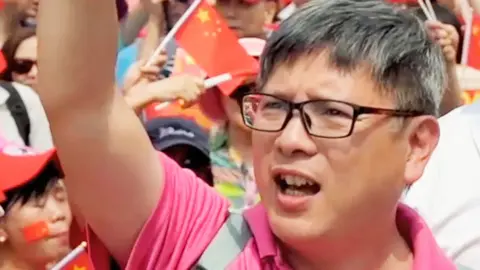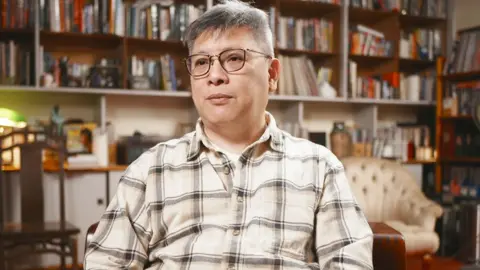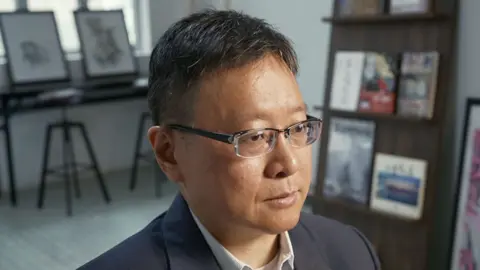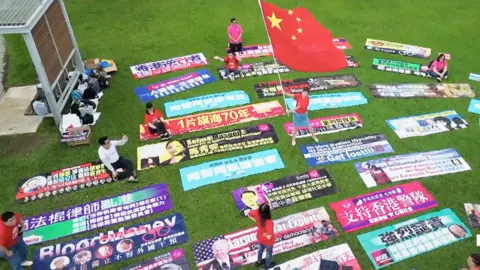[ad_1]
 Innes Tang
Innes TangFrom a woman waving a colonial-era flag in a shopping mall, to bakery staff selling cakes with protest symbols on them – dozens of Hongkongers have been reported to the police by one man for what he believes were national security violations.
“We’re in every corner of society, watching, to see if there is anything suspicious which could infringe on the national security law,” former banker Innes Tang tells the BBC World Service.
“If we find these things, we go and report it to the police.”
When the UK returned Hong Kong to China 28 years ago, internationally binding treaties guaranteed the city’s rights and freedoms for 50 years. But the national security law (NSL), imposed by Beijing a year after Hong Kong’s 2019 mass pro-democracy protests, has been criticised for scuttling free speech and press, and for ushering in a new culture of informing.
The law criminalises activities considered to be calls for “secession” (breaking away from China), “subversion” (undermining the power or authority of the government), and collusion with foreign forces.
An additional security law called Article 23, voted in last year, has further tightened restrictions.
With new laws and arrests, there has been limited reporting on Hong Kong’s pro-China “patriots” – the people who are now running and policing the city, as well as the ordinary citizens who openly support them. But the BBC has spent weeks interviewing Innes Tang, 60, a prominent self-described patriot.
He and his volunteers have taken screen grabs from social media of any activities or comments they believe could be in breach of the NSL.
He also established a hotline for tip-offs from the public and encouraged his online followers to share information on the people around them.

Nearly 100 individuals and organisations have been reported to the authorities by him and his followers, he says.
“Does reporting work? We wouldn’t do it if it didn’t,” Mr Tang says. “Many had cases opened by the police… with some resulting in jail terms.”
Mr Tang says he hasn’t investigated alleged law breakers himself, but simply reported incidents he thinks warrant scrutiny – describing it as “proper community-police co-operation”.
Mr Tang is not the only so-called patriot to engage in this kind of surveillance.
Hong Kong’s authorities have set up their own national security hotline, receiving 890,000 tip-offs from November 2020 to February this year – the city’s security bureau told the BBC.
For those who are reported to the authorities, pressure can be relentless.
Since the NSL was enacted in 2020, up until February this year, more than 300 people had been arrested for national security offences. And an estimated 300,000 or more Hongkongers have permanently left the city in recent years.
Pong Yat-ming, the owner of an independent bookshop that hosts public talks, says he often receives inspections from government departments which cite “anonymous complaints”.
He received 10 visits in one 15-day period, he says.
Kenneth Chan, political scientist and university lecturer, who has been involved in the city’s pro-democracy movement since the 1990s, jokes he has “become a bit radioactive these days”.

Some friends, students and colleagues now keep their distance because of his outspoken views, he says. “But I would be the last person to blame the victims. It’s the system.”
In response, Hong Kong’s government said it “attaches great importance to upholding academic freedom and institutional autonomy”. But it adds that academic institutions “have the responsibility to ensure their operations are in compliance with the law and meet the interests of the community at large”.
Innes Tang says he is motivated to report people by a love of Hong Kong, and that his views on China were cultivated when he was young, when the city was still a British colony.
“The colonial policies weren’t really that great,” he says. “The best opportunities were always given to the British and we [the locals] did not really have access.”
Like many of his generation, he nursed a longing to be united with China and taken out of colonial governance. But he says many other Hongkongers at the time were more concerned with their livelihoods than their rights.
“Democracy or freedom. These were all very abstract ideas which we didn’t really understand,” he says.
An average citizen should not become too involved in politics, he says, explaining he only became politically active to restore what he calls “balance” to Hong Kong society following the turbulence of 2019.
He is giving a voice, he says, to what he calls “the silent majority” of Hongkongers who do not support independence from China, nor the disruption created by the protests.
But other Hongkongers consider rallies and demonstrations a longstanding tradition, and one of the only ways to voice public opinion in a city that now does not have a fully democratically elected leadership.
“We are no longer a city of protests,” says Kenneth Chan, who specialises in Eastern European politics. “So what are we? I don’t have the answer yet.”
And patriotism isn’t inherently a negative thing, he says.
It is “a value, maybe even a virtue”, he argues, although it needs to allow citizens to keep “a critical distance” – something that is not happening in Hong Kong.
Electoral reform was pushed through in 2021 – stating that only “patriots” who “swore loyalty to the Chinese Communist Party” could hold important positions in government or the Legislative Council [LegCo] – Hong Kong’s parliament.
As a result, the council struggles to function, believes Hong Kong-based China commentator Lew Mon-hung, a former member of the Chinese government advisory body, the CPPCC.
“The public think a lot of these patriots are ‘verbal revolutionaries’ or political opportunists – they don’t really represent the people,” he says.
“That’s why ridiculous policies still pass with a huge majority. There is no-one to constrain or oppose, no-one to scrutinise.”
Even patriot Innes Tang says he wants to see the current system challenged.
“I don’t want to see every policy passing with 90% of the vote,” he tells the BBC.
There is a danger the National Security Law will be weaponised, he says, with people saying: “If you don’t agree with me, I accuse you of infringement of the national security law.”
“I don’t agree with this type of stuff,” says Mr Tang.
Hong Kong’s government said: “The improved LegCo is now rid of extremists who wish to obstruct and even paralyse the operation of the government without any intention of entering into constructive dialogue to represent the interests of all Hong Kong people.”
For now, says Mr Tang, he has stopped reporting on people. Balance and stability, he believes, has returned to Hong Kong.
The number of large-scale protests has dwindled to none at all.
In academia, fear of surveillance – and how life might change for someone who infringes the laws – means self-censorship and censorship have become the “order of the day”, says Kenneth Chan.
Pro-democracy parties are no longer represented in the Legislative Council and many have disbanded – including the Democratic Party of Hong Kong, once the most powerful party.
 Innes Tang
Innes TangInnes Tang has now set his sights overseas.
“There aren’t any particular issues in Hong Kong now, so I asked myself – shouldn’t I have a look at how I can continue to serve my community and my country?” he says.
“For a non-politician and civilian like me, this is an invaluable opportunity.”
He now works as a representative for one of several pro-Beijing non-profit groups, regularly visiting the UN in Geneva to speak at conventions giving China’s perspective on Hong Kong, human rights and other issues.
Mr Tang is also in the process of establishing a media company in Switzerland, and registering as a member of the press.
For Kenneth Chan in Hong Kong, his future hangs in the balance.
“One third of my friends and students are now in exile, another third of my friends and students are in jail, and I’m sort of… in limbo,” he says.
“Today I’m speaking freely with you… no-one would promise me that I would continue doing it for the rest of my life.”
In a written reply to the BBC, a Hong Kong government spokesperson said that national security is a top priority and inherent right for any country. It “only targets an extremely small minority of people and organisations that pose a threat to national security, while protecting the lives and property of the general public”.
[ad_2]
Source link




